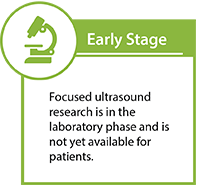Focused Ultrasound Therapy
Focused ultrasound is a noninvasive, therapeutic technology with the potential to improve the quality of life and decrease the cost of care for patients with irritable bowel syndrome. This novel technology focuses beams of ultrasound energy precisely and accurately on targets deep in the body without damaging surrounding normal tissue.
How it Works
Where the beams converge, focused ultrasound produces neuromodulation of the nervous tissue that regulates the bowel, potentially enabling irritable bowel syndrome to be treated without surgery. While significant preclinical work has been accomplished, there is still much to be done before this technology will be widely available.
Advantages
The primary options for treatment of irritable bowel syndrome include medication, which is often ineffective.
For certain patients, focused ultrasound could provide a non-invasive alternative that may be more effective that conventional treatments. Focused ultrasound can reach the desired target without damaging surrounding tissue, and can also be repeated, if necessary. Focused ultrasound neuromodulation does not have the side effects commonly found with systemic medications.
Clinical Trials
At the present time, there are no clinical trials recruiting patients for focused ultrasound treatment of irritable bowel syndrome.
Regulatory Approval and Reimbursement
Focused ultrasound treatment for irritable bowel syndrome is not yet approved by regulatory bodies or covered by medical insurance companies.
Notable Papers
Akhtar K, Hirschstein Z, Stefanelli A, Iannilli E, et al. Non-invasive peripheral focused ultrasound neuromodulation of the celiac plexus ameliorates symptoms in a rat model of inflammatory bowel disease. Exp Physiol. 2021 Jan 29. doi: 10.1113/EP088848.
Cotero V, Miwa H, Graf J, Ashe J, Loghin E, Di Carlo D, Puleo C. Periphereal Focused Ultrasound Neuromodulation. J Neurosci Methods. 2020 Jul 15;341:108721. doi:10.1016/j.jneumeth.2020.108721. Epub 2020 May 6.
Click here for additional references from PubMed.

